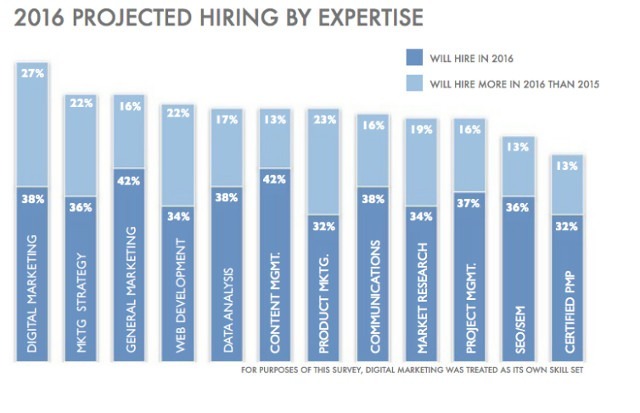

Have you recently left your job in marketing and are out in the market wondering what your next step may be? Or you might have been asked to leave your job and have no idea what to do next? We have interviewed the experts in the Swiss job market to give you their insights and help assess your next move.
Before getting into the specifics of finding a marketing job in Switzerland, I would like to share a brief overview of the situation over the past two years. The rise of the Swiss franc against the Euro, at the beginning of 2015, has had a big effect on the market. Many companies moved their headquarters or part of their operations to other countries with lower costs and/or many projects were frozen. As a consequence, the number of people getting unemployment allowance increased, and there was also a surge in demand of temporary positions due to uncertainty while the permanent job market decreased. However, the good news is that the situation is changing. The market has started to stabilize in a majority of industries and the forecasts shows that there is a positive trend by companies posting employment notices, as stated from recruitment firms job indexes Michael Page, Adecco job index. Nevertheless, the market is what it is and it’s better to focus on the elements you can influence as opposed the ones you can’t control.
 Currently, there is a big pool of marketing candidates in Geneva but fewer offers. This is the result of companies restructuring and their overall financial situation. These marketing candidates have a tendency to be more visible than other professionals in different industries, because they know how to market themselves. One of the ways for marketing candidates to promote themselves and increase their competency is by growing their digital skills. The latest report on marketing hiring from ‘McKinley Marketing Partners’ shows strong demand for digital skills in the marketing sector. This trend is confirmed by experts in the Swiss market. However, as Remi Diennet (Badenoch & Clark) states: 'marketing candidates are aware of this digital trend and are trying to position themselves as digital experts, however the true experts with deep digital knowledge are few. For example, somebody that has, among other activities, happened to develop some digital banners for example, cannot qualify as an expert, as opposed to a candidate that deeply worked extensively in Digital strategy, e-Commerce, Social Media etc.'
Currently, there is a big pool of marketing candidates in Geneva but fewer offers. This is the result of companies restructuring and their overall financial situation. These marketing candidates have a tendency to be more visible than other professionals in different industries, because they know how to market themselves. One of the ways for marketing candidates to promote themselves and increase their competency is by growing their digital skills. The latest report on marketing hiring from ‘McKinley Marketing Partners’ shows strong demand for digital skills in the marketing sector. This trend is confirmed by experts in the Swiss market. However, as Remi Diennet (Badenoch & Clark) states: 'marketing candidates are aware of this digital trend and are trying to position themselves as digital experts, however the true experts with deep digital knowledge are few. For example, somebody that has, among other activities, happened to develop some digital banners for example, cannot qualify as an expert, as opposed to a candidate that deeply worked extensively in Digital strategy, e-Commerce, Social Media etc.'
Overall, the Swiss market is a bit delayed in trends adoption compared to the centers of innovation such as the US or the UK. However, sooner or later they need to be part of the game. Charles Franier (Michael Page) says that, 'the big companies started their digital transformation the some years ago, while the smaller ones are catching up now. A majority of the corporations have few digital marketers internally (within marketing teams), who are coming up with topline strategies and are hiring external consulting/ digital agencies to add further value and guarantee correct implementation. On the other side, the smaller companies cannot afford to have resources internally and they count 100% on external agencies to help them formulate their digital activities. Therefore, the majority of roles in digital marketing are sitting within these agencies'.
Furthermore, as Remi Diennet (Badenoch & Clark) explains, digital maturity also depends on the industry; 'We see industries like retail, fast-moving consumer goods, food or services that are digitally advanced and are leading the way, while others are more conservative. Luxury goods for example are trying to identify the relevancy of new media for their business and potential impact in their image. Consumer behavior in that case is more ‘shop’ oriented, hence assessing the effectiveness of online marketing among this premium target group'.
Are entry level, medium or executive digital managers demanded more? The answer depends on who you ask. Usually, the positioning of each recruiting agency determines the position level they are working with. However, as a general rule of thumb, we can say that the top executives have been hired previously and currently there is a need for more junior, medium-plus levels.
In regards to most required skills, a combination of digital strategy and technical understanding is the optimal combination. And when it comes to technical knowledge, it’s not about being able to code or be an IT specialist, but having some fundamental understanding and to be able to communicate sufficiently with technical teams. A good digital marketer should be able to measure the effectiveness of digital campaigns, understand digital vehicles ROI and be familiar with key terminologies and the latest trends. Their competence comes from hands-on personal experience, and not only theoretical concepts.
Now that we have clarified the market’s needs, the next question would be if these candidates exist in Switzerland. According to our experts, it seems that there is a talent gap of qualified digital experts. As mentioned before, companies are trying to optimize resources, and are therefore looking for a 'gold unicorn' that might be hard to find, which results in importing people from other countries that are considered on the edge of digital trends, such as from the US or UK, or Nordic states (approximately 30% of workers come from abroad).
To start with, candidates should ensure that the basics are in place. The fundamentals include:
According to David Saxod (Interiman) ‘Most important for candidates looking to pursue a career in marketing would be to build or keep building their own network in this area. Select four or five agencies maximum, two or three specialized and two or three generalists. Try to also get in touch with internal recruiters / talent acquisition managers and follow company pages on LinkedIn would also be very important. An important and qualitative network will be the key to success when it comes to finding a new opportunity’.
Additionally to preparing the fundamentals and developing your network, you should also ensure that you position yourself in the right way. As Remi Diennet (Badenoch & Clark) explains, 'The candidate that will get the job is the one who will be able to translate the best his competencies in regards to the job he applies for. The one that will articulate better his added value and demonstrate his expertise throughout the funnel, from CV to the job interview. Avoid abbreviations and acronyms that are not broadly understood, leverage facts, data and figures to be perceived more credibly and showcase what you did differently to bring the results. At the end your expertise will be revealed from the way you assess the landscape you apply for and the propositions you will do'.
Digital marketing roles will continue to be popular for the next 24 months, along with data analytics, big data management, IOT, AI and other innovations. However, all these changes in technology do not only influence the total market and marketing jobs in particular, but also the way recruiting is happening. Charles Franier explains that, 'Michael Page is working already on how to leverage big data to foresee trends in the job market. This might go as far as to predict when a person is going to be on the job market by monitoring their behavior and then adapt the messages and job portals to their current life situation. At the end there is a reason to why Microsoft bought Linkedin and its huge database'.
Thanks to the below recruitment specialists that contributed with their insights.
 Remi Diennet : Badenoch & Clark is the recruitment firm specialized in Middle to Top Management roles of the Adecco Group. Since 1978, they have been helping professionals and leaders make the right connections across all industries in 10 areas of expertise. Their consultants are experts with an average of 10 years of experience in Switzerland. At Badenoch & Clark, they provide a personal approach, they invest in relationships and believe in respect and quality of execution.
Remi Diennet : Badenoch & Clark is the recruitment firm specialized in Middle to Top Management roles of the Adecco Group. Since 1978, they have been helping professionals and leaders make the right connections across all industries in 10 areas of expertise. Their consultants are experts with an average of 10 years of experience in Switzerland. At Badenoch & Clark, they provide a personal approach, they invest in relationships and believe in respect and quality of execution.

Charles Franier : PageGroup, listed on the London Stock Exchange (Pagegroup PLC), is one of the worldwide leaders of specialized recruitment. Active in Switzerland since 2001, PageGroup helps clients to find the most suitable candidates on the Swiss market and abroad. Thanks to its different brands, PageGroup offers a wide range of recruitment solutions: specialists and young professionals (Page Personnel), middle management and expert positions (Michael Page) and C-level profiles (Page Executive).
David Saxod : Interiman Group is one of Switzerland’s leading recruitment  and talent selection specialists for both permanent positions and temporary placements. Their various divisions can offer you tailor-made solutions. With their specialist knowledge of each of the sectors in which they operate, they offer personalized services and match their candidates to each business. In this case, Albedis will assist you in finding your next opportunity in marketing, sales, digital or communication.
and talent selection specialists for both permanent positions and temporary placements. Their various divisions can offer you tailor-made solutions. With their specialist knowledge of each of the sectors in which they operate, they offer personalized services and match their candidates to each business. In this case, Albedis will assist you in finding your next opportunity in marketing, sales, digital or communication.
Credit photo : alphaspirit via istock.com